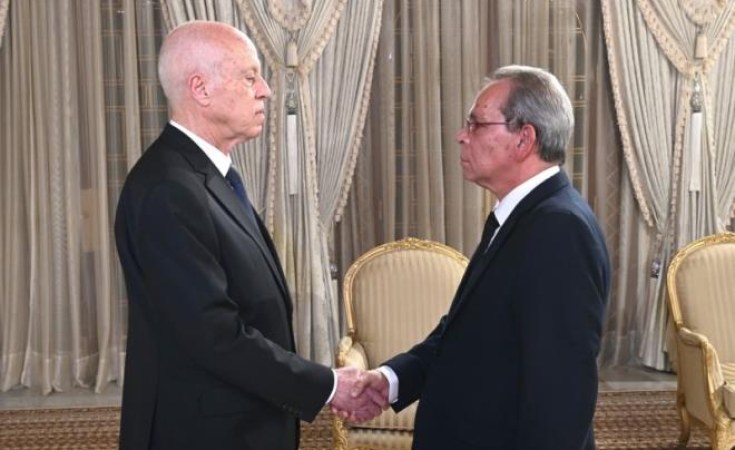The struggle of the Tunisian people for democracy has suffered significant setbacks under President Kais Saied who just won another term in an heavily criticized electoral process, raising concerns about the establishment of a new dictatorship.
The head of Tunisia's Independent High Authority for Elections (ISIE) Farouk Bouasker announced on Monday, October 7, that Tunisia's President Kais Saied won a second term with 90.69% of the votes in the presidential election held on Sunday. Bouasker also stated that Saied's competitor Ayachi Zammel garnered 7.35% of the votes, while Zouhair Maghzaoui garnered only 1.97% of the votes, noting that the voter turnout was 28.8%.
The Workers' Party of Tunisia issued a statement on Monday, rejecting the results of the presidential elections, in which Kais Saied won after "cracking down on opposition in the country". The statement described the elections process as a "charade" that resulted in the election of an illegitimate president, calling the Tunisian people to continue their struggle against authoritarianism. The statement also pointed out that the results of the elections and voting turnout were not surprising, as what the party called "the coup regime" received a blow by the Tunisian people.
On July 25, 2021, Kais Saied announced the dismissal of Prime Minister Hichem Mechichi, the suspension of parliament, and revocation of legislators' legal immunity, in addition to presiding over the public prosecution. These measures and actions were perceived by many as a self-coup aiming at crushing democracy in Tunisia. At the time, the Workers' Party had said in a statement that Saied had "launched a path towards re-establishing the system of absolute autocracy again."
Years later, they say that Saied's subverting of democracy has continued. They said in their most recent statement that "regardless of the extent of credibility of the preliminary results declared by Bouaskar's commission, they are sufficient to unveil the charade on the popular level," the Party's statement said. "The rate of non-participation exceeded 70%, which means that the majority of voters boycotted the charade for a reason or another. Most of the voters who boycotted the elections were youth, with a 6 percent turnout rate. This confirms the non-confidence of the entire electoral process, and represents an explicit condemnation of Saied. It is also a rejection of his coup regime that set the country back to dictatorship and has deepened dependency, poverty, unemployment, brain drain, illegal migration (locally known as Harqa), crime, in addition to the horrific deterioration in public services, dragging the country into a dark tunnel," the statement reads.
"Kais Saied organized elections, which lacked the minimum conditions for democracy, by blocking the door of freedom to stand for elections, imprisoning most of his competitors, placing them under surveillance, or pushing them into exile," the statement explained. Furthermore, the party slammed the Independent High Authority for Elections (ISIE) for disregarding the Administrative Court's decision, before what the party described as the "puppet parliament" stripped the Court's authority to adjudicate electoral disputes at the end of September, just days prior to the presidential elections. Fearing the nullification of the election results, the parliament instead transferred the jurisdiction over election-related disputes to the country's general appellate courts, which the party perceives as a "devastated judiciary".
According to the party, Kais Saied has tamed the media, subjugated the judiciary and the administration, and exploited the state's resources in his favor. From the party's point of view, the ISIE kept other two presidential candidates in the competition, ensuring that their role would not exceed the role of "decorating" the process unwillingly. The first behind Saied, Ayachi Zammel, was imprisoned and sentenced to 12 years in prison, days before the election took place.
In response to what they see as an erosion of democracy in the country, the Workers' party and other progressive forces in Tunisia have called for people to mobilize. "The Workers' Party that rejected the coup from the beginning, along with all the illegitimate procedures and actions that were taken by the authorities to consolidate an absolute autocracy, and which called all democratic progressive movements to boycott the charade that already happened on October 6, is calling all these movements today not to recognize the results of this charade and to decline the legitimacy of the president, who was elected through it. The party is also calling for continuing the struggle in order to counter tyranny, repression, impoverishment, and starvation, in addition to foiling the tampering of the country, and further selling and mortgaging it to foreign countries. Saied has no legitimacy or lawfulness, not only due to the outcome of his rule, but also because the vast majority of voters boycotted his charade," the Party said in its statement.
The Workers' Party concluded the statement by suggesting that the solution for the problems that Tunisia and its people have endured will not be reached through the tyrant regime, and not even by compromising with it, dealing with it, or participating in its "electoral charade", but through struggling against the regime until its downfall. The party also urged the progressive movements to unite, and approach Tunisian people, regroup and mobilize them towards a real bailout program, enabling them to get rid of populism and its tyranny. The party also believes that this would open up new horizons for the people to make their dream of obtaining "work, freedom, and national dignity" true, after it was denied by subsequent regimes that ruled Tunisia since the dictatorship was overthrown following the 2010-2011 revolution until now.


